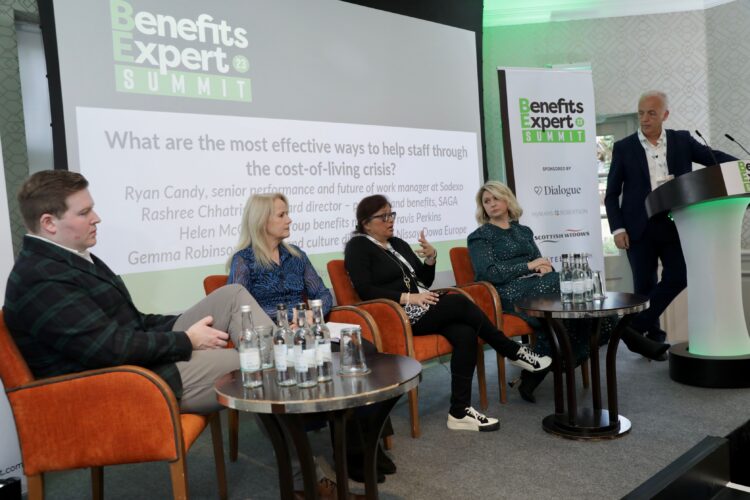Navigating the economic perfect storm calls for comprehensive financial support approaches.
This was one of the key points made at a Benefit Expert summit panel debate. The discussion revealed varying approaches among businesses, emphasising practical measures, such as promoting everyday discounts and core benefits. The focus extended beyond benefits, with an acknowledgement that a supportive work environment, flexibility, and understanding of non-financial aspects are vital for overall employee wellbeing.
Ryan Candy who is a senior performance and future of work manager at Sodexo highlighted that the European markets, particularly in the UK, have been hit hard, with Brexit and the conflict in Ukraine contributing to a challenging situation. Candy sees a convergence of multiple factors creating a challenging situation for employees, describing it as a “perfect storm.”
Helen McGowan, the group benefits manager at Travis Perkins highlights that many people are unaware of available government benefits, including cases of eligible individuals, like teachers, not claiming them.
She said: “A lot of people don’t realise that there are benefits out there that the government provides that they can access and are eligible for. We’ve heard cases of teachers that have been on around £60K a year that could claim benefit and apparently, there is £6K a year per employee that is just going unclaimed at the moment.”
She added: “We’re conscious that it’s probably the lower-paid people that are more immediately impacted. We put things in place to support them more immediately. In terms of what I am thinking about now, is for those kinds of mid-range colleagues who perhaps weren’t impacted immediately but are now in a situation where they’ve perhaps exhausted savings and are starting to perhaps get into debt. I don’t think we’ve seen the end of this yet.”
Rashree Chhatrisha pensions and benefits reward director at Saga agreed adding that the day-to-day promotion of the discounts platform is “powerful”.
She said: “We work with Reward Gateway as well so it’s that continued promotion and also real-life stories on our intranet from other colleagues on how much money they have actually saved as cashback or how much money they are saving on day-to-day things.”
McGowan however said that there is consideration for not encouraging discretionary spending. She said: “We did put a stop to the emails going out that were advertising the more luxurious items. So things like holidays, Booking.com there’s a great discount on there, but we didn’t have those in our email comms and we were focusing instead on saving money.”
“The whitegoods Reward Gateway does something called smart tech which allows you to buy whitegoods from Currys and pay about salary sacrifice similar to cycle. We concentrated on those core benefits, the core discounts, the main everyday spending.”
McGowan also mentioned that at Travis Perkins a cost-of-living payment for individuals below a specific salary threshold was implemented last year.
However, before the panel discussion, attendees were asked about their own financial support options, revealing that only 38% provide one-off cost-of-living payments, while 62% offer a financial wellbeing app.
Attendees were tasked with ranking financial support options for supporting employee financial resilience, and the order of effectiveness was determined as follows: financial education/coaching sessions, discount offers, discounted or employer-paid financial advice, financial wellbeing app, and then one-off cost of living payments.
Gemma Robinson people and culture director Aioi Nissay Dowa Europe explained that while employee benefits are crucial, they’re not the only factor in ensuring employee wellbeing. She emphasises the importance of genuinely caring for employees, listening to their needs, and understanding the non-financial aspects of wellbeing.
Robinson said the focus is on creating a supportive work environment by considering factors like flexibility, work-life balance, and staying attuned to the changing needs of the workforce. It’s not just about offering benefits but actively engaging and adapting to meet the holistic well-being needs of employees.
Chhatrisha added: “We don’t want to raise expectations that this is going to happen for the next 5 years but still recognise that we may not come out of this cost-of-living.
“It’s that broader promotion of everything that we do. It’s that whole holistic approach rather than focusing on family finance, wage stream or cost-of-living payments.”












